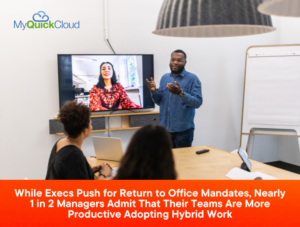- Over half (54%) of UK workers say hybrid working is their preferred work structure
- 40% of UK workers would decline a job if they were not given flexible working hours
- Presenteesim 2.0: Managers (41%) are more likely than general employees (23%) to go to the office for a few hours just to show their face
- Nearly half (44%) of employees are concerned that working remotely will mean they miss out on opportunities
Owl Labs, a global collaborative technology company, today launches its annual State of Hybrid Work study, polling 2,000 full-time employees across the UK, as well as 12,000 respondents globally*. The research reveals that employees continue to demand flexibility from their employers and, in particular, expect a pick ‘n’ mix style of hybrid working rather than a one-size-fits-all approach. There is also a deep disconnect between managers and employees, with over half (54%) of UK workers wanting a hybrid work structure, yet nearly 56% of managers are more likely to ask the opinion of those they physically work with.
Flexible working reigns supreme
While there has been a steady rise in return to office mandates from the likes of Google, Zoom and Goldman Sachs, employees are currently winning the battle to retain flexibility. According to the research, 46% of UK employees are working in a hybrid format and two in five (40%) would decline a job if they were required to be in the office five days a week. With the rise of ‘shift splitting’, the ‘evolved work week’, task-based and structured hybrid working, employees want to pick the hybrid approach that works best for them. So much so that as the UK Flexible Working Bill is set for royal assent, almost two thirds (64%) of UK workers believe that flexible work should be a legal right.
The four-day work week is still seen as one of the most important aspects of flexible working as 65% of workers are willing to take a pay cut for this benefit. This is partly due to an ongoing desire for better work-life balance, given that 38% also admit that their work-related stress has increased since last year. What’s more, 41% of UK employees have changed jobs or are actively seeking a new opportunity for a better work-life balance, implying that their previous employment did not provide sufficient flexibility.
This rise in work-related stress can also be attributed to the ongoing cost of living crisis as the latest ONS figures show that around half (51%) of adults are spending even more than usual on their food shopping. As it stands, hybrid workers spend £21 a day on average working from the office including food, parking and work drinks. In contrast, those working from home spend just £14 a day on average. Unsurprisingly, 36% of workers could be convinced to go into the office more if their company paid for commuting and parking posts, while a further 31% would be persuaded by free or subsidised food and beverages to help offset the costs associated with working from the office. To mitigate concerns around the cost of living crisis, almost 1 in 3 (29%) employees have an additional job or “side hustle”, with 34% of those workers with a “side hustle” admitting that they need additional income to cover their expenses.
Workers are also mindful of the time wasted while travelling into the office as almost 1 in 2 (48%) workers have a 31-60 minute one-way commute to their offices. Those in the office full time could be wasting up to ten hours a week simply commuting.
Productivity paranoia
Wider concerns around the UK’s lower productivity levels compared to its European counterparts have amplified outdated views of flexible working. Despite nearly half (48%) of managers admitting that working hybrid or remotely has made their team more productive, they risk pushing a ‘faux hybrid’ working culture – a growing expectation to be in the office – with the sole purpose of appearing more productive, rather than boosting wider team productivity.
Despite ONS data revealing that UK productivity is above pre-covid levels where hybrid work has become the norm, 1 in 2 (52%) UK workers believe their company is requiring them to work from the office because of ‘traditional’ working practices. ONS figures align with Owl Labs State of Hybrid research, where the majority (85%) of hybrid and remote workers say they have been the same or more productive than when they were full time in the office.
Frank Weishaupt, CEO of Owl Labs, comments, “Collaborative technology solutions deliver a truly hybrid working experience to employees, satisfying both the worker and management by offering a fully flexible working pattern while maintaining productivity levels. Our immersive technology is the second best thing to being in the room with your colleagues and, given that 87% of those we surveyed stated that at least one participant in every meeting they attended was remote, it’s essential to have a solution that delivers every time, wherever you or they are.”
In contrast, forced presenteeism poses a threat to productivity. Coffee badging – where hybrid employees go into the office for a few hours a day just to show their face – is on the rise, especially among managers (41%) compared to general employees (23%). As a result, 44% of workers are concerned that pressure to return to the office could impact their ability to do their job effectively and mean they miss out on opportunities if they decline. Based on this, nearly half (45%) of workers are concerned that managers view those in the office as harder working and more trustworthy than their remote counterparts, while a further 40% are concerned that working remotely will impact their career progression.
Weishaupts continues, “As the September surge of return to office mandates continues, hybrid working policies are falling short of employee expectations. Workers want greater flexibility and they’re not afraid to walk away from or get creative with jobs that don’t afford them the level of flexibility they expect. This doesn’t mean that workers don’t want to be in the office at all, but that they think the office works better for some tasks than others. To ensure that work policies foster a happy and productive workforce, employers need to incorporate greater flexibility into their approaches to hybrid work.”
Methodology:
*The survey was conducted in June 2023 by Vitreous World in which 12,000 full-time employees across the UK, US, Germany, France, Netherlands and the Nordics were interviewed in the UK (2,000), US (2,000), France (2,000), Germany (2,000), the Netherlands (2,000) and Nordic countries (2,000).





